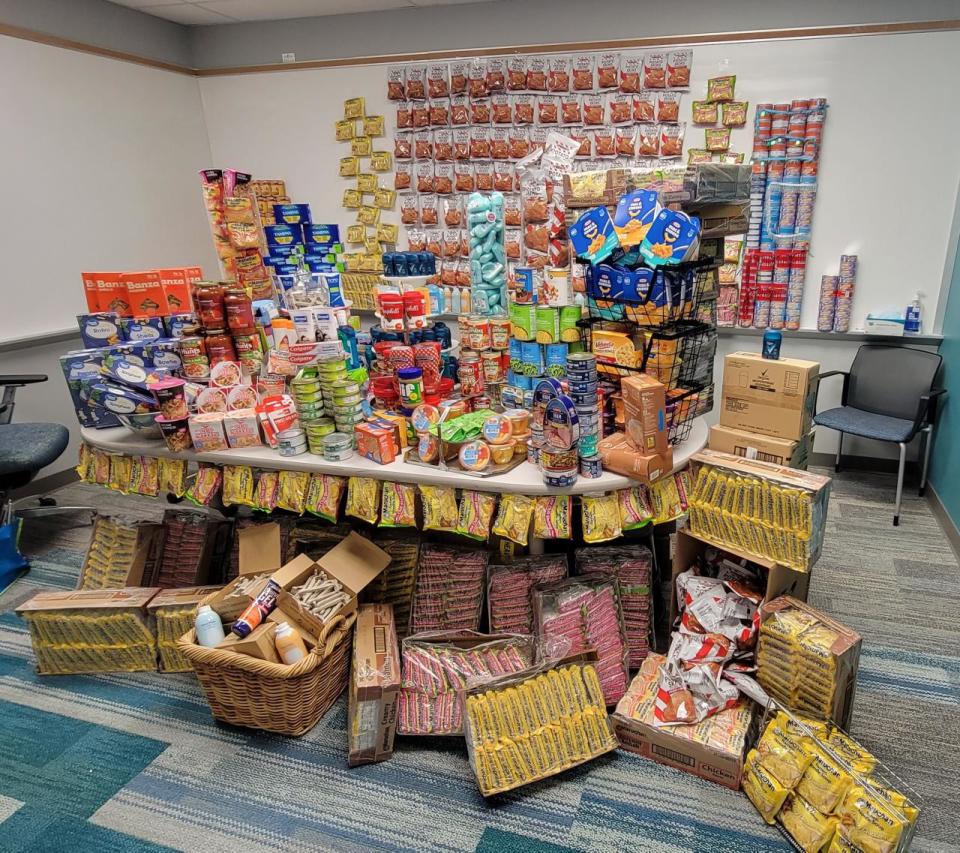Sarasota-Manatee colleges offer assistance to students facing food insecurity

The growing issue of food insecurity in the region over the last few years has prompted local colleges to get involved, opening campus food pantries to ensure students have access to food when they need it.
Four colleges along a seven-mile stretch of North Tamiami Trail – Ringling College of Art and Design, New College of Florida, the University of South Florida Sarasota-Manatee, and State College of Florida – as well as South Florida State College in DeSoto County all operate food pantries for their students, some for the last several years.
According to 2020 data from the Florida Department of Health, the food-insecurity rate in Sarasota County was 10.8% and 11.2% in Manatee County, compared to the state average of 10.6%.
The U.S. Department of Agriculture defines food insecurity as a lack of consistent access to enough food for every person in a household to live an active, healthy life.
A college community pitches in
At State College of Florida’s campus in Bradenton, the school recently wrapped up a successful food drive in which faculty and staff competed by department to collect items for its pantry.
“I was overwhelmed with how many departments signed up and actually offered to donate food,” said Tessa Bravata, SCF’s student life coordinator.
These student food pantries typically offer nonperishable staples such as canned goods, pasta and peanut butter. Most also offer toiletry items such as deodorant and razors. At SCF, that also includes pet food and diapers.
Bravata said supplies have been low since Hurricane Idalia hit Southwest Florida in August. “Our pantry has been really low on donations because the community has had a high need.”

Like other colleges, SCF’s pantry relies on community donations, mainly from faculty and staff, and an occasional grant. “The Community Foundation of Sarasota County has helped us greatly in the last couple of years, especially when the hurricane hit, and then COVID,” Bravata said.
All Faiths Food Bank partnered with New College in 2019. The New College pantry averages about 130 visits a month, according to All Faiths’ Director of Strategic Communications Nina Harrelson.
All Faiths also supplies items to the pantry at South Florida State College’s DeSoto County campus, which averages about 420 visits a month and is open to students, faculty and their families.
Filling the need
SCF’s pantry is also busy, Bravata said, noting she restocks items constantly. “I see students every day who need to use the pantry. Right now, they’re struggling to pay their tuition, pay for books, just afford basic necessities.”
SCF’s student population is as varied as the community itself. “Sometimes that’s a working parent who has several kids,” Bravata said. “Sometimes it’s someone coming back to school for the first time, or an 18-year-old fresh out of high school who’s been told, ‘All right, you’re 18. Congrats. Go support yourself, get an apartment.’”
Students without a support system, at times, don’t have reliable access to food. “The food pantry helps ease the burden,” she said.
SCF has pantries at each of the school’s three campuses, in Bradenton, Venice and Lakewood Ranch, serving an estimated 200 or 300 users a year. “We make sure that all of them are stocked to the capacity that they need to be for the student body to come in and use them.”
A few miles south, at the University of South Florida Sarasota-Manatee, the Support-A-Bull pantry is available to students who can either submit a request virtually or “stop by the pantry whenever the building is open,” said Health & Wellness Coordinator Brittany Aburto, adding that confidentiality rules make estimating its overall usage difficult.
Even students who live on campus and have access to dining halls are not immune to food insecurity. Dining hall hours and class schedules don’t always mesh; a student’s ability to go off campus can be a problem without transportation.
The two schools with dormitories, New College and Ringling College, are located in a largely commercial part of the city with no supermarkets within easy walking distance of campus.
Neither New College nor Ringling responded to requests for information on their food pantries.
A countywide problem
Harrelson, of All Faiths Food Bank, says they are distributing more food and seeing an increased need due to sharply rising costs of rent, food, insurance and gas, as well as the recent crises of COVID-19, inflation, and hurricanes Ian and Idalia.
According to All Faiths, in Sarasota County, nearly 9% of the population lives below the poverty level. A United Way report says of Sarasota’s 204,000 households in 2021, 38% lived below the ALICE (Asset Limited, Income Constrained, Employed) economic level, meaning they made more than the federal poverty level but not enough to receive support for their basic household needs such as housing, food, childcare, transportation, health care, etc.
According to Feeding America:
· In Florida, 2,314,370 people are facing hunger, including 613,180 children.
· In the United States in 2022, 44.2 million people lived in food-insecure households.
· 7.3 million children lived in food-insecure households in which children and adults were food insecure.
For more data, visit All Faiths Food Bank’s website.
Jim DeLa is a reporter for the Community News Collaborative. Reach him at jdela@cncfl.org.
This article originally appeared on Sarasota Herald-Tribune: Regional colleges offer assistance to students facing food insecurity

